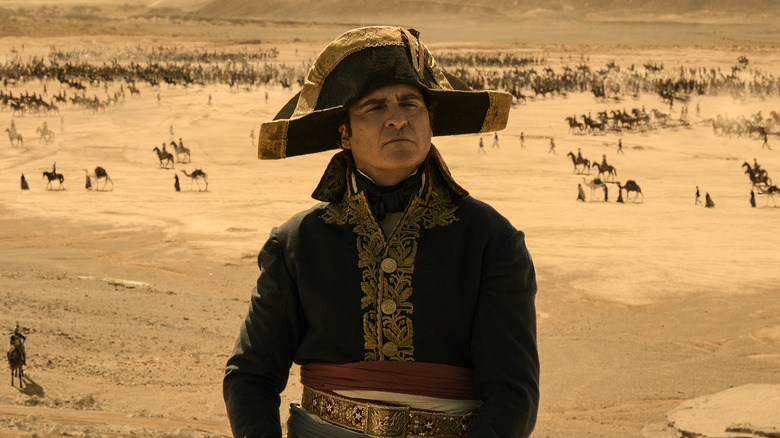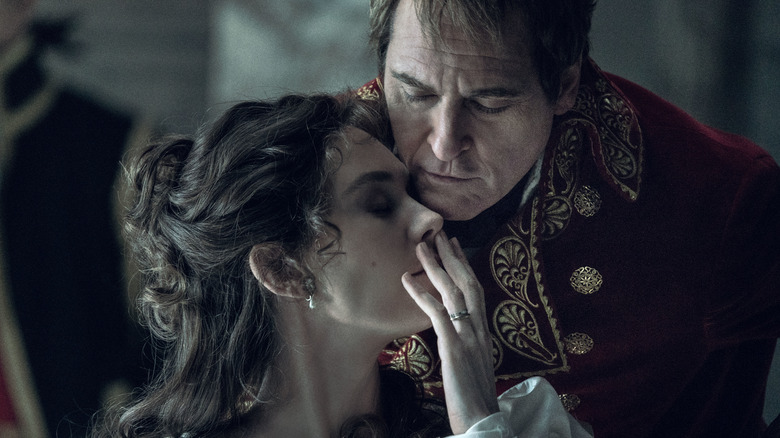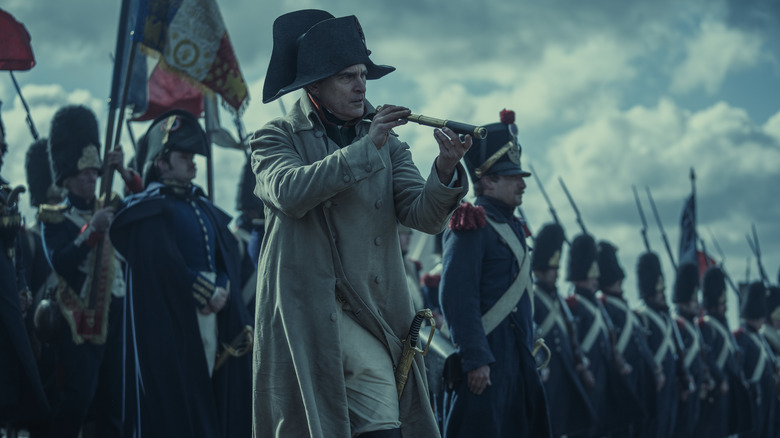Napoleon Review: Little Man, Big Movie
- Stunning battle set pieces
- Strong performances from Joaquin Phoenix and Vanessa Kirby
- Tries to fit too much into the film
- Hops from important moment to important moment without letting any of the narrative breathe
As far as historical figures go, Napoleon's kind of a big one (despite, ironically, commonly being perceived as diminutive). Trying to make a movie that captures both his genius and his very real flaws, as Ridley Scott's "Napoleon" attempts to do, is a tall order indeed. But despite its powerful battle sequences, it falls somewhat short of its goal, spreading itself thin — much like Napoleon himself during his infamously disastrous invasion of Russia — by trying to cover too much ground. Joaquin Phoenix puts in a nuanced performance of the incomparable Napoleon Bonaparte, but the scope of the biopic overwhelms everything else it has going for it.
When we first meet the young Corsican soldier in "Napoleon," he's angling for a promotion amidst the backdrop of the French Revolution. He's got a bit of a chip on his shoulder, hailing as he does from a small backwater island and being considered little more than a coarse outsider to French society. So the fact that he's particularly eager to prove himself is hardly a surprise. The film follows him through his many military exploits, as he marries the charming Josephine (Vanessa Kirby) and rises through the ranks, building a larger following with every battle he wins. But nothing lasts forever, and although Napoleon eventually becomes emperor of all France, it's a tenuous position, one that relies on his ability to produce an heir and, more importantly, have continued success on the battlefield.
The man, the soldier
In the lead role, Joaquin Phoenix is most successful in highlighting the contrast between Napoleon the soldier and Napoleon the man. On the battlefield, he is calm, measured, and always a step ahead of his opponents. He commands respect from his troops and is obeyed without hesitation. But in his private life, he's kind of a mess. Phoenix sheds all sense of ego in creating a vision of the famed Napoleon as a man who frequently appears ridiculous before his wife, sending her endlessly fawning, needy love letters while she's happily carrying on an affair back in France.
His relationship with Josephine is complicated, but no less compelling for it. Although they have a few rough patches early on in their marriage (to put it mildly), they develop a genuine friendship and become prized confidants. In the aftermath of Josephine's affair, they both force each other to say that they are nothing without one another. And in a way, this is true — after all, it's only after their relationship is torn asunder that Napoleon's position as leader of France is threatened. His desperate bid to sire an heir is just one more example of him trying to prove himself as a man, a soldier, and an emperor.
How much more could we pack into this thing?
The biggest problem with "Napoleon" is that it simply attempts to take on too much. To cover the entirety of Napoleon's military career, to say nothing of his romantic relationships, political intrigues, and repeated exiles, is a fool's errand. In order to try and tackle such a gargantuan Wikipedia article of a narrative, it has to flit from battle to coup attempt and back again, and as each of the events is barely touched upon, they often fail to make much of an impact. In the moments when "Napoleon" allows itself to devote time to the kind of set pieces that Ridley Scott is known for, it's stunning. The Battle of Austerlitz in particular is breathtaking in its horror, all fog and ice as men are led to their doom.
These are also the moments at which we can most take in exactly why Napoleon is such a captivating figure. The ways in which he — and by extension, the film — manipulates the battlefield to his own ends, arranging men and cannons as though they were little toy soldiers, is incredibly satisfying to watch. But these moments are much rarer than they ought to be in a film about one of history's greatest generals, and "Napoleon" suffers for it. What might have worked better is a less chronological approach, focusing instead on one major battle or campaign with flashbacks to earlier in Napoleon's career. Realistically, you could make an entire film about the invasion of Russia — instead, it occupies a mere 10 minutes or so of "Napoleon." This approach also means that it takes quite some time before we actually get to see Napoleon in action as a successful commander, and with Joaquin Phoenix's emotionally detached performance, there's not much for us to latch onto in the first third of the film.
Despite this, there are certainly high points that stand out in "Napoleon." It has an excellent supporting cast, from Rupert Everett's haughty Duke of Wellington to Ben Miles' cooly intelligent diplomat, Coulancourt. Whenever it's able to build up some narrative momentum, it's a joy to watch, and although it's over two and a half hours, it never drags. It's just a shame that it spends so much of its runtime jumping from topic to topic just as we're beginning to get invested in what's put before us. Ridley Scott's "Napoleon" is certainly ambitious, but it's also unwieldy, and the performances from Joaquin Phoenix and Vanessa Kirby aren't quite enough to completely rescue it from its missteps.
"Napoleon" hits theaters on November 22, before premiering on Apple TV+ at a later date.


